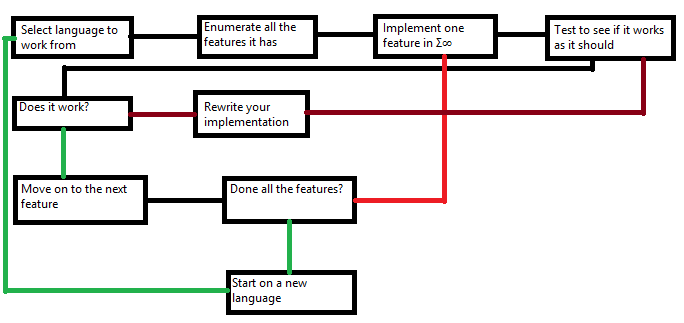TL;DR: No. Programming languages are too diverse.
Reason 1: Purpose
There are, according to Wikipedia's list of programming languages, 806 distinct programming languages, excluding BASIC dialects and esoteric programming languages.
There are some features of each language that wouldn't be too hard to merge: most programming languages have some form of conditional processing, variable declaration, arithmetic and mathematical operations, output, and input - among the other similarities. These are the parts that would be relatively easy to merge together (as long as we can decide on a style, which might take quite a while...).
There are other parts of other languages that cannot easily be merged, many of which depend on the purpose of the language. JavaScript, for example, is a dynamic Web scripting language used to give webpages interactivity. A lot of it is used here on StackExchange to load content dynamically without having to reload the page. This process is called AJAX.
AJAX is designed for the web. It is not designed for desktop applications, such as could be written in Java or C# or C or C++ (etc etc), that can be multithreaded and load content dynamically without a mention of AJAX: that's just how these languages work.
Taking JavaScript and Java as an example, we can also see that the purpose of the programming language matters. JavaScript is designed for the web; Java for installation on a system. JavaScript, therefore, has no file access, for security reasons - to ensure malicious websites can't access your files easily. Assuming this theoretical coverall programming language (which I'm going to call Σ∞ or Sigma Infinity) also has to suit every purpose, it has to be suitable for both the web and the installed versions. To satisfy this requirement, the language designers would be forced to release two different versions of the language - one without file access, one with - to maintain security.
As maintainers of modular languages or languages with multiple versions will tell you, this is a big task - ensuring that both versions are...
- Compatible with each other
- Up to date
- As close to identical as possible
- Supported
- Tested
- Documented
- Used
...is a big ask. You'd need to create a huge company to support Σ∞.
No, it is true, this does not preclude the possibility of Σ∞ existing. However, since we're talking practicality here, it is more practical for multiple companies to maintain multiple languages than it is for one huge company to maintain Σ∞.
Reason 2: Features
806 programming languages contain a lot of features. Ignoring the compatibility problems of purpose that we've just discussed, creating Σ∞ is going to take a long time simply because of the sheer volume of stuff the creators have to include. For every language, the creation process might look something like this:

Looking at an old post on StackOverflow, it seems many developers spend much more time bug-fixing than writing new features. Therefore, it's going to take a long time to even get one feature implemented, let alone one language, let alone 806 languages.
Yes, I may be exaggerating slightly, and you can just hire a lot of developers, but the time and the money going into the Σ∞ project are going to be significant.
Reason 3: Filesize
A simple one, and one more easily overcome than the previous two but still worth mentioning. The C redistributable and runtime take up 37MB, compressed, on my computer. That's about 45MB uncompressed. Assuming that C is a representative language in terms of filesize, that gives us 38700MB or 38.7GB as the total size of Σ∞.
That's slightly less than I was expecting, and certainly not a lot in terms of storage requirements. However, Internet connections need to develop significantly before downloading such a file - users don't want to wait too long for installers to download a single file, especially if there are more files to download for the program.
As I said, this problem is much easier to deal with: we're talking the future so you can probably assume better internet connections. Just a point worth mentioning.
Reason 4: Typing and Compilers
This has been covered in other answers, so I'll just go over it quickly: depending on the language's purpose and level within computing, the compilation and runtime processes differ significantly.
JavaScript, for example, is interpreted, at runtime. The browser's code translates JS into runnable code just before it's run. Additionally, JavaScript is weakly typed - you don't have to declare that this variable is an integer and this is a string, you just say var.
C#, by comparison, is a strongly typed, precompiled language. You do have to say that this is an integer and this is a string, and your code won't compile if you don't. (OK, there's var in C# too, but it still gets typed at compile-time.) Additionally, you have to run your code through a compiler, which turns it into an executable that you can run.
Merging the two types of languages would be rather difficult, if not impossible.
Finally...
I conclude, therefore, that there are too many programming languages, and too many different types of programming languages, for the Σ∞ project to be feasible - let alone practical.


